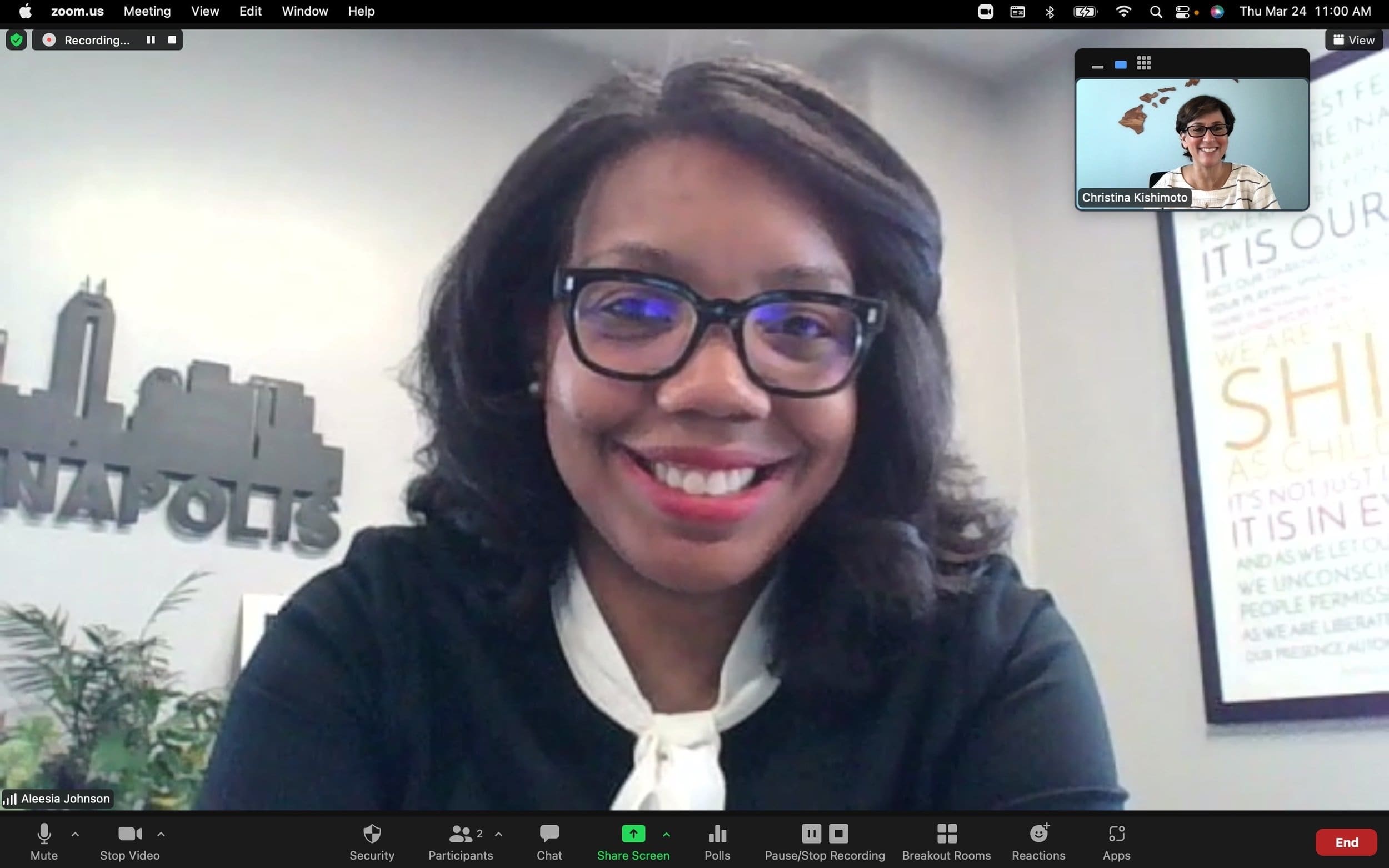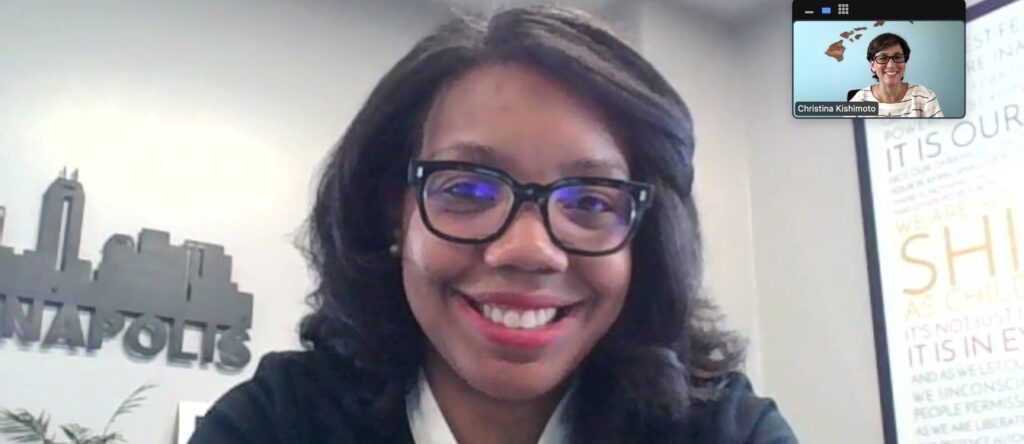APRIL 2022 | DR. CHRISTINA M. KISHIMOTO
Throughout history, but more so today in light of the national political climate, there is a risk that women leaders of color take in boldly vocalizing equity stances on behalf of students. Dr. Aleesia Johnson keeps it real as we sit down to talk about her perspective on the superintendency, politics, and leadership. While gender politics in the U.S. today still results in biased perceptions of the desirability and capabilities of women in the Chief Executive seat, when we look at the impact of leaders like Aleesia, we see student-centered boldness that is needed at greater levels nationally. Unfortunately, we also see discomfort with the intersectionality that women present as they bring their authentic selves as women, women of color, mothers, and other aspects of identity.

Aleesia shares, “It’s about how we define leadership in society, in a country where when they are considering who is ready to lead, what comes to mind is often not a woman, and it certainly is often not a black woman or a woman of color either.” Women struggle to be noticed as viable candidates to lead as School Superintendents. Despite the deep pipeline of women teachers (78% nationally) and women Principals (40% nationally), the data clearly shows that Boards of Education continue to give preferential consideration to men for the top seat (27% women; 73% men).
Aleesia and I talked about how this intersectionality has shown up in living color on our news feed in the Supreme Court nomination hearings held this week. A highly competent, highly articulate, highly successful judge sits before Congressional members in what appears to be a mismatch of intellect and purpose. The obvious tension that comes from Judge Jackson being seen as Black woman first and a judge second, by certain Congressional members, is palpable. And for the people of our nation who have a front row seat to this race and culture war at the highest level of governance and government, we are all squirming in our seats. “There are genderized concepts of leadership. Just watching the Hearings this week has been triggering for me. Just watching how this imminently qualified woman is being mistreated by men.” Aleesia sees the areas of progress for women leaders in education, but calls it out as being accessible to only a select few. “The disproportionality of men to women in the Superintendent seat is immense, and as a woman, something that we talk about in the black community holds true. We often have to work twice as hard to get half as much. Whether that is respect, position, pay. You have to be on your game as a woman all the time, in a way that men are not held to.”

If intersectionality seems to you like another racialized concept of the day, consider the change that has taken place in the Indianapolis Public Schools (IPS). IPS has a majority black student population at 40.3% and an overall BIPOC student population of nearly 79%. Yet in the school system’s 133 year history, Aleesia is the first black woman superintendent. Aleesia shares an interesting perspective about her role in history making. “I always say, I am the first Black woman to be Superintendent, but I certainly am not the first one that was ready to serve. I am fully aware that I am the first to get the opportunity, not the first to deserve the opportunity.” The research is clear that representation impacts students’ perception of self. Yet, history shows that biased culture has deep roots. “We are a school district that was forced to integrate. There were deeply held racist views in our past.”
Aleesia shared that her board and community are highly supportive, and while being a black woman in the CEO seat matters in creating a greater sense of inclusivity in children’s perceptions, she feels accepted for who she is as a leader. Along with her predecessor who is a Latina woman, Aleesia recognizes that they broke through both the gender and racial barrier that was part of IPS’s history. One of Aleesia’s leadership strengths is that she expects her team to show up as who they are, and because of this she believes her team brings particular strength in reflecting the diversity of the Indianapolis community.

There is nothing surprising about Aleesia finding herself in the public school Chief Executive seat. With a family history of educators, Aleesia shared, “I always loved school. Definitely a nerd! I came from a family of educators. My mom is an elementary school Principal. My grandfather was a teacher, Principal and worked in the central office. My grandmothers – one was a Sunday school teacher and the other was a teaching assistant. Education, schools, going to school events, all of that was part of the fabric of my growing up. So the fact that I landed in education is not shocking at all.” The step from Deputy Superintendent for Academics to Superintendent though brought new challenges, a much broadened scope of work, and a spotlight.
“For this role, what I did not fully appreciate was the political nature of it. I knew it, but I didn’t fully appreciate it until I got into the seat.” Unlike other roles that Aleesia held internally that allowed her to focus in on a set of particular areas, the typical day of the Superintendent is a scramble of many areas from facilities, to school events, media events, curriculum decisions, board meeting preparation, and yes, politics. “We are coming out of a legislative session where we spent a lot of time really battling back what felt like very unnecessary culture war bills. One was the anti-CRT bill worded as divisive concepts that can’t be taught in schools. We spent a lot of time on discussions that were not about how we make learning for our kids better. We are still seeing high absenteeism among high school students, and that tells me that there is something that our older students are not seeing as particularly valuable and are thus not showing up.”
While Aleesia talked about the ways in which instruction and support have to be improved coming out of COVID, the legislature seems out of step. Aleesia described the frustration among leaders in spending so much time blocking harm, rather than rebuilding responsive systems for kids. With a long deep breath that reminded me of Supreme Court nominee Jackson at points during her recent Hearing, Aleesia shares her thoughts about this point in our political history. “As a leader, it’s figuring out what is the capital I should expend, I’m willing to expend, or if it’s up to someone else that needs to be the carrier of a particular message. That calculation is happening so often in my mind. I’m asking myself should these words come out of my mouth or do I need to have a male board member carry the message. These days we are all making calculated decisions about who is saying what to whom and where. That navigation is mentally tiring.” She further shared, “a lot of our energy is being spent on the defensive mode thinking about how to ward off undoing all of the racial equity work we’ve been doing for years.”

Despite the challenges of the position, Aleesia has a balanced view of life. “You are not your job. Work is not my whole life. I am also a mother, wife, sister, daughter, friend… and the people in my life help to fulfill me and help me to demonstrate my love for others.” Her advice to aspiring superintendents? Stay true to yourself. Honor who you are. Find a board that will support you. Identify a great mentor and thought partner for your first year on the job. Create a ring of support that comes from a great network of other women leaders. “You have to be who you are. There is no superintendent uniform or hat to put on. It’s you.”
Great advice from April’s voice for equity – Dr. Aleesia Johnson!
————————–
Dr. Aleesia Johnson was named Superintendent of the Indianapolis Public Schools in June 2019, a school district of 23,000 students. Dr. Johnson has deep experience in curriculum and innovation at the school and district level, and taught at the middle school level.

Featured Voices for Equity made possible through the sponsorship of Scholastic

